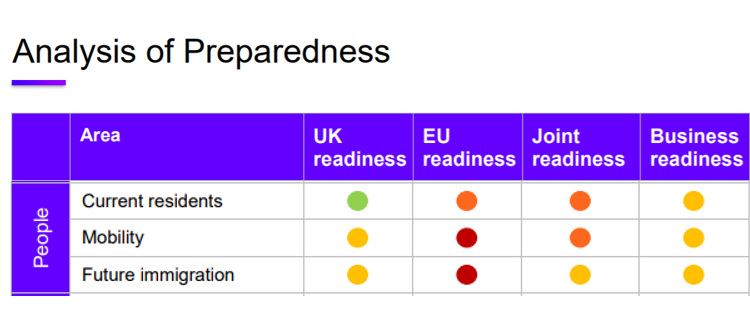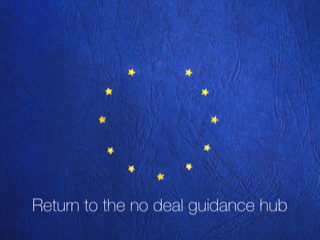With an estimated 3.6 million EU citizens living in the UK, 1.3 million UK citizens living in EU Member States, and thousands of employers who have built their business on the ability to easily travel within the EU, the effect of no deal on people is profound.
What are the key challenges facing business in this area?
Is there anything employers need to do regarding existing EU staff?
As long as they meet some basic requirements, EU nationals already resident in the UK will be able to stay and have their rights protected in the event of no deal. EU citizens resident in the UK by 31 October 2019 can apply for the EU Settlement Scheme, for free, in the event of no deal – exactly as if there were a deal. Under current government plans, employers will not need to undertake retrospective right to work checks on existing EU employees. Existing right to work checks such a checking EU nationals passports/ID cards will continue.
How will immigration change after no deal?
EU nationals arriving after exit day in the event no deal will initially have a 3-month transitional period where EEA citizens and their family members, including Swiss citizens, will be able to come to the UK to visit, work or study as they do now. To stay longer than 3 months they will need to apply (and pay an unknown fee) to receive ‘European Temporary Leave to Remain’, which is valid for a further 3 years. To stay beyond 3 years, EEA citizens will need to make a further application under the new system, from 2021.
How will no deal impact business travel?
UK citizens will not need a visa when travelling to the Schengen area (the 26 European states that have officially abolished all types of border control at their mutual borders) for short stays of up to 90 days in any 180-day period. However, it is unclear what rights UK nationals would have to work in EU countries in the event of no deal. UK nationals will likely default to the differing immigration rules of individual member states regarding their right to work.

Key questions for business to consider
Continuity plans for no deal will be unique to every organisation. However, there are some key questions your plan should answer, to ensure the major issues are covered.
- How many EU nationals work in your organisation?
- Have you communicated plans and guidance around your organisation?
- Does your current talent pipeline rely on EU nationals?
- Do you have the skills needed to cope with technological change in the near future?
- Is your HR team equipped to deal with any changes to rules following a no deal exit?
- How much business travel does your business conduct within EU countries?
CBI guidance
Want the highlights?
Want the deep dive?
Other resources to help you plan
- Look at the toolkit for employers and HR departments, which covers the key details of the EU Settlement Scheme. The deadline for EU nationals to apply for settled status will be 30 June 2021, or 31 December 2020 if the UK leaves the EU without a deal.
- Help your employees to understand what they need to do. The EU Settlement Scheme will open fully by 30 March 2019. This tool will help your employees understand whether they need to apply, and when to do so.
- Encourage your employees to keep updated by receiving regular email updates from the Home Office.
How are other businesses preparing?
GSK
“A key component of our Brexit planning has been supporting our people who may be personally affected by Brexit. GSK is offering access to specialist immigration services for those wishing to understand what they need to do to continue to live and work in the UK post-Brexit, or to help formalise their residency status either in the UK or an EU country. In summer 2018, we ran a webinar that outlined the latest information on the EU Settlement Scheme, and we continue to provide regular, informative updates to affected employees – We’re offering UK nationals in the EU personalised assessments and specialist support to navigate local immigration systems. A personal consultation with an immigration services provider is available to both UK and EU based staff, if needed.”
“Beyond this, we have given managers detailed information packs to guide conversations about Brexit, and our dedicated intranet hub houses extensive information including a recording of the webinar, Brexit factsheets, employee Q&A, links to relevant GOV.UK pages and an internal Brexit Mailbox for questions about our Brexit activity and support. Employees have said that they appreciate the timely information and support that GSK has provided.”
- Senior Vice President HR, GSK










